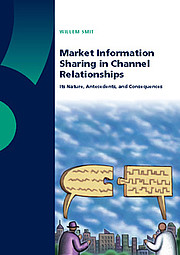Market Information Sharing in Channel Relationships Its Nature, Antecedents, and Consequences Defended on Thursday, 23 February 2006
Efficient Consumer Response, Supply Chain Management, Quick-response, Vendor-Managed Inventory, Collaborative Planning and Forecasting, are all names for channel arrangements in which retailers and suppliers actively work together to transform the supply chain into a demand-driven channel in order to fulfill consumer wishes better, faster, and at lower costs. For collaborative channel arrangements it is essential that retailers and suppliers keep each other informed about the latest consumer market developments. This dissertation focuses on market information sharing practices in retailer–supplier channel relationships. By investigating the underlying nature, it finds that it is important to separate sharing mode from the shared content. The sharing mode in the information sharing arrangement is the way in which information is communicated between the retailer and the supplier. One important lesson is that the content shared in a channel relationship follows a hierarchical structure, meaning that channel members share more confidential and strategic information only after sharing more superficial operational information. The dissertation also exposes the circumstances in which channel firms are most inclined to share strategic information in a more collaborative manner. Furthermore, two studies with different methodologies demonstrate that market information sharing leads to a better channel performance. This dissertation not only provides an in-depth insight into market information sharing practices, but also gives marketers precise guidelines to design effective market information sharing arrangements.
Keywords
Market Information Sharing, Retailing, Marketing Channels, Interfirm Collaboration, Supply Chain Management, Efficient Consumer Response, Vertical Marketing Systems, Hierarchical Scaling, Social Penetration Theory, Self-disclosure











